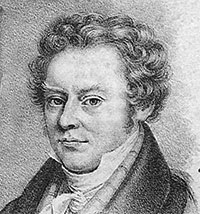You can help expand this article with text translated from the corresponding article in Swedish. (March 2022) Click [show] for important translation instructions.
|
This article needs additional citations for verification. (September 2022) |
Johan Niclas Byström (December 18, 1783 – 1848) was a Swedish sculptor.[1][2]

Byström was born at Filipstad and went to Stockholm at the age of twenty, studying there for three years under Johan Tobias Sergel. In 1809 he gained the prize of the Royal Academy of Arts, and in the following year visited Rome. He sent home a beautiful work, "The Reclining Bacchante," in half life size, which raised him at once to the first rank among Swedish sculptors.[3]
On his return to Stockholm in 1816, he presented the crown prince (the later king Charles XIV) with a colossal statue of himself,[4] and was entrusted with several important works. Although he was appointed professor of sculpture at the academy, he soon returned to Italy, and with the exception of the years from 1838 to 1844 continued to reside there. He died in Rome in 1848.[3]
Among Byström's numerous productions the best were his representations of the female form, such as Hebe, Pandora, Juno suckling Hercules (infra), and Girl Entering the Bath. His colossal statues of the Swedish kings were also much admired.[3]
Gallery
edit-
Young woman with flowers wreath in her hair, by Johan Niklas Byström. Marble. Nationalmuseum, Stockholm, Sweden
-
Carl Johan Adlercreutz, count, officer, and statesman, by Johan Niklas Bystroms. Marble. Nationalmuseum, Stockholm, Sweden
References
edit- ^ Nyman, Thure (1934-01-01). "Byström i Stockholm". Konsthistorisk Tidskrift/Journal of Art History. 3 (1–4): 87–98. doi:10.1080/00233603408603177. ISSN 0023-3609.
- ^ Pettersson, Lennart (1998-01-01). "Johan Niklas Byström och Bengt Erland Fogelberg ‐ Samtidiga svenska skulptörer i Rom". Konsthistorisk Tidskrift/Journal of Art History. 67 (2): 93–114. doi:10.1080/00233609808604454. ISSN 0023-3609.
- ^ a b c Chisholm 1911.
- ^ Kent, Neil (2001). The Soul of the North: A Social, Architectural and Cultural History of the Nordic Countries, 1700-1940. Reaktion Books. pp. 284–285. ISBN 978-1-86189-067-2.
Attribution:
- This article incorporates text from a publication now in the public domain: Chisholm, Hugh, ed. (1911). "Byström, Johan Niklas". Encyclopædia Britannica. Vol. 4 (11th ed.). Cambridge University Press. p. 906.